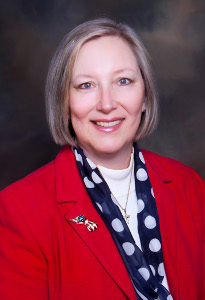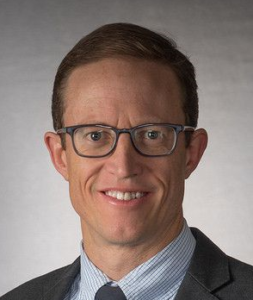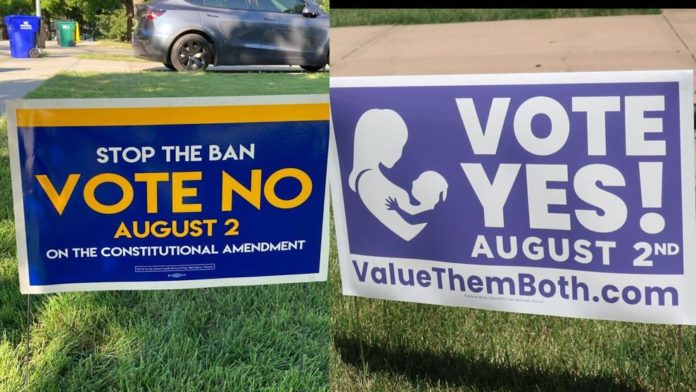Opponents of a constitutional amendment removing abortion as a protected right in Kansas succeeded where others who went before them failed.
Four times since 2014, states approved similar amendments, which succeeded with support from rural voters who overwhelmed any success in urban centers.
On Tuesday, opponents of the abortion amendment picked that lock, winning not only in populated areas but winning – or at least drawing even – in some outlying rural areas.
Efforts to defeat the amendment followed the same path that carried Democratic Gov. Laura Kelly to victory in 2018 when she won nine mostly urban counties.
Not only was the amendment defeated in those nine counties, but it lost in 10 other counties, including some that overwhelmingly supported President Donald Trump.
Most rural Kansas counties supported the amendment, but similar to how Kelly was elected in 2018, the amendment was defeated overwhelmingly enough in populated areas to offset any big losses in rural areas where there were fewer voters.

“We built a sprawling network of organizations and people who were engaged on this issue,” said Ashley All, spokeswoman for Kansans for Constitutional Freedom, the primary group opposing the amendment.
“We had field organizers in some of the big counties who were running canvasses and all of that,” All said.
“We also had partner organizations in their local communities who were engaging with their communities, their families, friends and neighbors in a way that was unique to any other campaign I worked on.”
The amendment lost in places like Osage County where 56% voters opposed the amendment in a county Trump won with 71% of the vote in 2020.
Likewise in Franklin County, 56% of voters there opposed the amendment in a county Trump won with 68% of the vote.
Even as far west as Seward County, the amendment drew about even in a county Trump won with about 63% of the vote. Only 10 votes separated the “yes” votes from the “no.”
It also lost in other Trump counties such as Miami (Trump won with 69%), Greenwood (Trump won with 79%) and Geary (Trump won with 55%).
Meanwhile, the amendment suffered heavy losses in population centers like Douglas County where 81% of voters cast ballots against the measure and in Wyandotte County where it was opposed by 74% of voters. And In Johnson County, it lost with 69% of the vote.
Even in Sedgwick County, where supporters believed there was solid political infrastructure to pass the amendment and abortion was already a deeply rooted issue, the measure was defeated with 58% of the vote.
It also lost big in Riley County where it was opposed by 68% of voters and in Shawnee County where 66% of voters came out against the amendment.
“This isn’t a partisan issue for people,” All said. “The vast majority of Kansas believe that people ought to have the right to make decisions about their body and their health care without government interference,” she said.
“It’s complicated,” she said. “People have complicated feelings about it. It’s a personal issue. It’s a health care issue. For some, it’s a moral and religious issue. There are a lot of things that go into it when they are making these decisions.”
The Value Them Both Coalition, the primary group supporting the amendment, said it had no comment on Wednesday after the election.
It referred all comments to the statement it issued Tuesday night, blaming the loss on “misinformation” spread about the amendment by media.
“Over the last six months, Kansans endured an onslaught of misinformation from radical left organizations that spent millions of out-of-state dollars to spread lies about the Value Them Both Amendment,” the organization said.
“Sadly, the mainstream media propelled the left’s false narrative, contributing to the confusion that misled Kansans about the amendment,” the group said.
Chuck Weber, executive director of the Kansas Catholic Conference, echoed a similar view but also said the Supreme Court decision overturning Roe contributed.
The court decision came about a month before the vote on the Kansas amendment, although the case had been on track for a year to be decided this summer and was foreshadowed three months early when the opinion was leaked.
“For people who follow the abortion issue, this is like the holy grail, this is like the No. 1 issue for the last half century,” Weber said.
When Roe was overturned, “that was like a seismic level earthquake in the pro-life, pro-abortion world,” Weber said.
The Supreme Court case energized opponents who rallied against the amendment, seizing on the idea that banning abortion in Kansas was now a real threat if the measure passed and there was no backstop in the federal courts.
But the supporters also had some division within their ranks among voters who were reluctant to support the amendment because it did not go far enough.
Republican state Rep. Samantha Poetter Parshall, who represents Miami County, said there were voters in her district who thought the amendment was too loosely worded.

She said there were abortion rights opponents who feared that the amendment could give a more liberal Legislature in the future the ability to pass laws that would be less restrictive than anything on the books today.
“They were not happy with the wording of the amendment and they wanted it to be stronger and just be a protection of the unborn,” Poetter Parshall said.
“Over the last month, I had constituents who were on board urging the vote for it and supporting it to flipping completely because their fear was that it eventually would end up allowing abortions,” she said.
Ultimately, Poetter Parshall said she was not surprised by Tuesday’s outcome in Miami County.
“The conservative Republican base in my area was not supporting it because it wasn’t going far enough,” she said. “That’s why I really truly believe it lost.”
Conservative political operative Matt Schlapp, who campaigned for the amendment in Kansas, expressed a similar view on Twitter in suggesting the amendment was weak.
“Kansas is a strongly pro life state that does not want to take timid steps as VTB was,” Schlapp posted on Twitter.
“Ironically the pro choice crowd in Kansas should have embraced VTB as it is the best case scenario for them,” he said.
Republican state Sen. Molly Baumgardner represents Miami County.
She, too, believed that the amendment struggled for support with hard-line abortion opponents, but also believed that opponents’ messaging was successful because they made it a “referendum of fear.”
“There’s definitely a group of Kansas voters that felt that because it wasn’t an outright ban, they shouldn’t support it,” Baumgardner said. “We know that to be true.”

“There were absolutely organizations of college students that were not supportive because the constitutional amendment was not a ban,” she said.
Baumgardner also said there has been some early indications that men did not get out to vote as anticipated.
“More men than usual did not vote, at least in the advance voting,” she said. “It’s safe to say there was a gender factor.”
Polling leading up to the election showed the amendment drawing support generally from voters who were older, conservative, Republican and male who had a high school education.
It was generally opposed by voters who were younger, liberal, Democratic and female who have a college or post-graduate education, the poll shows.
Nationally, abortion rights experts were astonished by not only the amendment’s defeat but by the decisive margin given that it was held during a primary election in a red state when turnout is smaller and tends to be dominated by conservative voters.
“To get such a result, a lot of things had to work in the favor of the amendment’s opponents,” said Glen Halva-Neubauer, who studies abortion politics at Furman University.
“They had to get a large turnout in urban areas and among the growing number of unaffiliated voters,” he said.
“They did that, but the polling data taken in advance of yesterday’s vote also suggested that the skew in favor of ‘yes’ on the rural and reddest parts of the state was not as strong as one might think.
“It turned out that survey correctly measured the skepticism toward the amendment even in the most conservative parts of the state,” he said.

The one poll that was made public showed that almost 40% of voters in the Republican-dominated 1st Congressional District opposed the amendment.
And another 29% of those Big 1st voters also thought it banned abortion, compared to 31% statewide who thought it outlawed the procedure.
The results of the election – the first test on abortion following the reversal of Roe – should be a warning sign to Republicans about how to approach the issue, some political scientists and experts on reproductive rights said.
“Even though they stacked the deck in favor of this passing, it still failed,” said Joshua C. Wilson, who studies abortion politics at the University of Denver.
“That shows you a mobilized public that is opposed to aggressively going after abortion,” Wilson said.
“If it fails in a heavily Republican state like Kansas, where the vote was set up to heavily favor its passage, then that should be a warning to Republicans across the entire country.”












